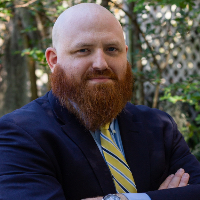 Fluker Divorce & Family Law Lawyers, Louisiana
Fluker Divorce & Family Law Lawyers, Louisiana
Sponsored Law Firm
-
 x
x

Click For More Info:
-
Hidalgo & Associates
528 W 21St Ave Covington, LA 70433» view mapDivorce & Family Law Trusted Lawyers
We have over 25 years worth of legal experience. We can assist you in a variety of legal matters.
985-249-5195
Sponsored Lawyers
1-10 of 50 matches
Accident & Injury, Divorce & Family Law, Criminal
Wyman spent the first four years of his practice with a national firm primarily representing insurance companies in losses sustained as a result of Hurricanes Katrina, Rita and Gustav. Wyman also represented carriers and insurers in property damage and personal injury losses sustained as a result of transportation activities, as well as doing general liability litigation. Due to the very nature of his practice, Wyman had the opportunity to practice in the United States District Courts for the Eastern, Middle, and Western Districts of Louisiana, in addition to over fifteen different state district courts. Wyman has also participated in over fifty mediations, and he understands the importance of maintaining open lines of communication in the litigation process. In 2011, Wyman left that firm to join with Gabe in founding Bankston Duhon, LLC, a firm that focuses on securing justice for those who have been aggrieved. Wyman and his wife Millie are avid quarter horse owners and are members of Calvary Christian Center.
(more)Immigration, Personal Injury, Divorce & Family Law, Criminal, Workers' Compensation
Miguel Abraham Elias is an aggressive litigation attorney with strong leadership, vast trial experience, and excellent negotiation skills. Born in Puerto Rico and half Cuban, Miguel is fully bilingual in both English and Spanish. Miguel left Puerto Rico when he was fifteen years old to study at Monteverde High School near Orlando, Florida. He then attended Loyola University in New Orleans, Louisiana, graduating in May of 1994 with a Bachelor in Business Administration and a concentration in Management and Marketing. He went on to pursue a law degree at Loyola University School of Law in New Orleans, where he obtained his Juris Doctorate in Common Law with Civil Certificate in May of 1997. In 1998, Miguel received his license from the Louisiana Supreme Court and began his practice as an associate at the Law Office of Neville G. Orrett, where he had previously worked as a paralegal. He was quickly promoted to named partner. He continued his practice at the Law Office of Orrett & Elias for two years. In the year 2000, Miguel opened his own practice- Miguel A. Elias, APLC. Since then, his office has served clients of all nationalities and throughout the State of Louisiana. His practice continues to be at the forefront of professional and excellent legal representation. Miguel resides in Kenner with his lovely wife and four beautiful daughters.
(more)Criminal, Divorce & Family Law, Lawsuit & Dispute, Business, Estate
Bill Hidalgo is a 1990 graduate of Louisiana State University Law School and has over 25 years of legal expertise. A resident of Covington, Louisiana, he serves the Greater New Orleans area and specializes in DWI/DUI defense, personal injury, insurance, business litigation, family and criminal law. A leader in Louisiana law, he authored, “Relation Back of Consortium Claims: A Search for Facts and Notice,” which appeared in the Louisiana Law Review 1089 in 1989.
(more)Divorce & Family Law, Child Custody, Child Support, Wills & Probate, Business Organization
Carla Haney is a Louisiana licensed Attorney and Registered Nurse. She started Haney Law Firm (HLF) to provide affordable legal services to the community. HLF is committed to providing professional, quality legal representation that is client-centered and cost-effective. Whether you are going through a divorce or need to establish paternity, we are here to help and listen to your side of the story. We will represent you with integrity and compassion.
(more)Divorce, Child Custody, Wrongful Death, Car Accident, Personal Injury
William Brian Jones opened WB Jones law office soon after completion of the Texas Bar Exam. Mr. Jones believed that in starting his own practice, he could be more effective in helping people deal with a variety of legal issues with a primary focus on Personal Injury, Family Law, and Business Organizations. Since then, Mr. Jones has represented clients in State and Federal legal issues. WB Jones and Associates has allowed Mr. Jones to fully realize his passion for helping businesses and individuals at all levels of their needs. WB Jones Law Office's primary practice areas: Family Law, Personal Injury, and Business Organizations.
(more)Criminal, Felony, Ethics, RICO Act, Divorce & Family Law
Jacob Longman is currently the Managing Partner of Longman Jakuback, APLC. A botique litigation firm, Longman Jakuback specializes in complex and criminal litigation at the trial and appellate level in both state and federal court. Jacob spent time in both law enforcement and the military before attending law school. Before graduating from the Paul M. Hebert Law Center, he was President of the Student Chapter of the Louisiana Association of Criminal Defense lawyers, worked as a student investigator for the East Baton Rouge Public Defender's Office and was a judicial intern at the 19th Judicial District Courthouse. He career has taken him across the state of Louisiana. Several of these have set legal precedents in the field of criminal law. These include State v. Crockett, State v. McQuarter, State v. DiGeralmo, and State v. Steele. He is currently the President-Elect of the Louisiana Associate of Criminal Defense Lawyers.
(more)


 William Hidalgo Covington, LA
William Hidalgo Covington, LA






